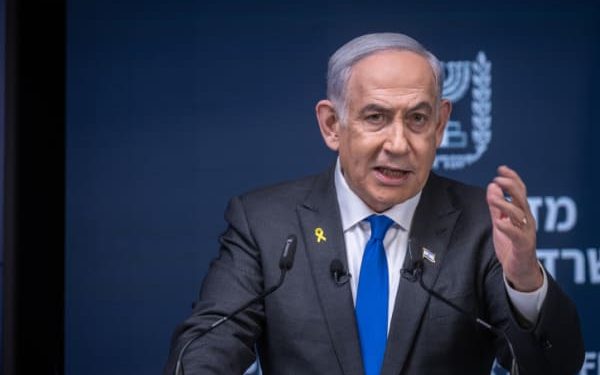Prime Minister Benjamin Netanyahu speaks during a press conference in Jerusalem on September 2, 2024. Photo by Chaim Goldberg/Flash90
During the weekly Cabinet meeting, Prime Minister Benjamin Netanyahu warned there would be a “heavy price” after a Houthi missile penetrated Israeli airspace early Sunday morning.
Netanyahu blamed Iran for the provocation, saying the Islamic Republic “is striving for our destruction.”
“We are in a multi-front campaign against Iran’s axis of evil, which is striving for our destruction,” he told the Cabinet. “This morning, the Houthis launched a surface-to-surface missile from Yemen at our territory. They should know that we exact a high price for any attempt to attack us.”
“Whoever needs a reminder of this, is invited to visit the port of Hodeidah,” Netanyahu continued, referring to the Israeli Air Force attack on the Houthi-controlled port in July following a drone attack. He added, “Whoever attacks us will not evade our strike.”
Netanyahu issued a similar warning after that drone attack, however, except for the Hodeidah port strike, Israeli military forces have refrained from taking further action against Houthi targets in Yemen.
The Houthis responded to the bombing of the Hodeidah port by launching a ballistic missile at Israel, which was intercepted near the port city of Eilat, Israel’s southernmost point on the Red Sea.

Police at the site where a Ballistic missile fired from Yemen, hit an open area near Moshav Kfar Daniel, Sept. 15, 2024. Photo by Yossi Aloni/Flash90
On Sunday afternoon, Houthi spokesman Yahya Sare’e claimed the group launched a hypersonic ballistic missile at Israel which traveled approximately 2,000 km (1,250 miles) in just eleven and a half minutes.
Sare’e also claimed the missile successfully hit its target. Israel said the missile was destroyed, breaking apart in the air, with fragments landing in an open area. Images on social media and news reports showed a fire burning in an open field. However, it is unknown if the fire was caused by missile fragments or by interceptors that were launched to neutralize the threat.
Sunday’s missile attack marked the deepest penetration into Israeli territory by a Houthi missile so far. The IDF stated that they are investigating the incident, acknowledging that the interceptors launched did not perform as well as expected.
“An initial inquiry indicates the missile most likely fragmented in mid-air,” the IDF said in a statement.
“During the incident, several interception attempts were made by the Arrow and Iron Dome Aerial Defense Systems, and their results are under review. Sirens were sounded in accordance with protocol. The entire incident is under review.”
However, the IDF also denied that the Houthi missile was a hypersonic missile.
Jerusalem Post Middle East senior correspondent, Seth Frantzman, said the Houthi attack on Sunday proves “that Iran and its proxies are undeterred.” Frantzman noted that despite the Gaza War effort, “Israel has largely been on the defensive since October 7.”
During the Cabinet meeting, Netanyahu acknowledged the difficult situation Israel is facing, especially in the North, and promised that “the current situation will not continue.”






































